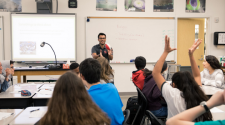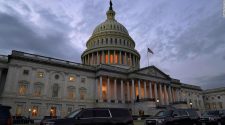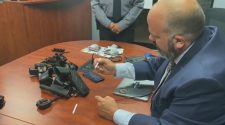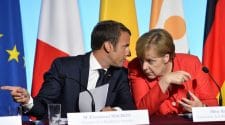with Tonya Riley
Elon Musk built a career on contrarianism.
But his characteristic defiance and bluster carries new legal and public health risks amid a global pandemic.
The Tesla chief executive took his campaign against government stay-at-home orders to a new level yesterday as he openly dared California authorities to arrest him in a tweet. Musk said the company would operate its Fremont, Calif., manufacturing plant, flouting Alameda County orders, my colleague Faiz Siddiqui writes.
Tesla is restarting production today against Alameda County rules. I will be on the line with everyone else. If anyone is arrested, I ask that it only be me.
— Elon Musk (@elonmusk) May 11, 2020
Musk is becoming a symbol of the reopening movement in an industry that led the country in sending workers home.
Musk is at odds with the cautious approach many other tech titans have taken to bringing employees back to work. Companies including Amazon, Google and Facebook have already told their employees who can work remotely they can continue to do so far beyond state and local authorities’ shelter-in-place timelines — in some cases through the end of the year.
A worker descends from the top deck of a car carrier trailer carrying Tesla electric vehicles at Tesla’s primary vehicle factory after CEO Elon Musk announced he was defying local officials’ coronavirus disease restrictions by reopening the plant in Fremont, California. REUTERS/Stephen Lam
Musk’s defiance is just the latest in a series of erratic efforts to challenge restrictions state governments have adopted in an effort to slow the spread of the coronavirus. Last month, he called shelter-in-place orders “fascist” during an expletive-filled rant during the car company’s quarterly earnings call.
Tesla also sued Alameda County, where his Fremont plant is located, over the restrictions on its operations, after Musk went on a Twitter tirade attacking the county over the weekend. Musk further threatened in a tweet to move the company’s operations out of California to another state, suggesting Texas or Nevada.
Musk’s remarks stood in sharp contrast to Facebook’s quarterly earnings call, where chief executive Mark Zuckerberg warned investors he was concerned that reopening parts of society too quickly could cause future viral outbreaks. Zuckerberg predicted that would spark “worse longer-term health and economic outcomes.” Facebook told employees they will be permitted to work from home for the remainder of 2020, though some offices are planning to reopen beginning in July.
Tesla’s own employees are worried about ramping up production too quickly.
Two workers at the Fremont facilities, who spoke to Faiz on the condition of anonymity because they feared for their jobs, said they were worried about the sudden escalation of production. One worker told Faiz that people gathered in groups and there was little enforcement of social distancing practices.
The company is giving employees masks and showing workers a video about the need to practice social distancing.
“Everybody’s walking around without their mask on, talking, hanging out talking among themselves,” the worker said. “It’s scary.”
The stay-at-home orders pose a greater business risk to Tesla than other Silicon Valley giants.
Companies that largely provide Internet services or software are benefiting as American life increasingly shifts online as people stay home. But Tesla has unique business challenges because it relies on manufacturing cars.
The company has warned investors that the closure of its Fremont facility would affect its financial performance, at least short-term, in a year when it began delivering its long-anticipated Model Y crossover, a vehicle that was expected to appeal to a broader market of car buyers.
Musk has allies, though the majority of the tech industry is hunkering down.
Several venture capitalists have banded behind Musk. Keith Rabois, a general partner at Founders Fund, said on Twitter:
yes he has the right to challenge the government’s policy. that is precisely the American system. Gavin is killing people not Elon.
— Keith Rabois (@rabois) May 11, 2020
In a subsequent tweet, Rabois argued that forcing people to stay indoors kills, reiterating a claim President Trump has repeatedly made that a prolonged shutdown economy could lead to greater rates of suicide and other health issues.
Previously, Marc Andressen, who sits on the board of Facebook, angel investor Jason Calacanis and venture capitalist Adam Draper rallied behind Musk as he criticized the coronavirus-related restrictions, as Faiz and Nitasha Tiku reported.
Musk also has powerful supporters in the Trump administration.
Eric Trump, the president’s son, liked Musk’s tweet yesterday.
Treasury Secretary Steven Mnuchin told CNBC yesterday that the company should be allowed to resume production.
“I agree with Elon Musk,” Mnuchin said. “He’s one of the biggest employers and manufacturers in California, and California should prioritize doing whatever they need to do to solve those health issues so that he can open quickly and safely.”
The Tesla CEO’s rhetoric mirrors a broader protest movement that has been bubbling up across the country.
Protests against coronavirus-related government restrictions have spread through Chicago, Kentucky, Los Angeles, Pennsylvania and Michigan in recent weeks. Trump has supported some of these protests in tweets.
Most state governments have begun to take steps to ease the coronavirus restrictions, including in California, where Musk’s battle with Alameda County is brewing. California Gov. Gavin Newsom said in a news conference yesterday that he was not aware that Tesla had reopened its car plant. Newsom (D) said he deferred to local officials to make the decision on whether Tesla could operate, even as the state has allowed manufacturing to resume with modifications.
Musk has taken issue with the fact that local officials’ word could supersede the state’s.
Alameda is trying to work with Tesla to avoid a greater escalation of the situation.
“We are addressing this matter using the same phased approach we use for other businesses which have violated the Order in the past, and we hope that Tesla will likewise comply without further enforcement measures,” county spokeswoman Neetu Balram said in a statement. The county learned Monday the company was conducting business beyond minimum basic operations, she added.
She said Tesla was expected to submit a plan late yesterday detailing how it would reopen. “We look forward to reviewing Tesla’s plan and coming to agreement on protocol and a timeline to reopen safely,” she added.
Fremont police would need to enforce the order, but they did not respond to Faiz’s request for comment.
Alameda County Supervisor Scott Haggerty told Faiz that while conversations continue with Musk, “I can’t stop him from breaking the health order.” He credited the county’s tough line in part with the relatively low occurrence of the illness in Alameda County, roughly 2,000 cases and 71 deaths.
Haggerty said he hopes it would not come to arrests. He told Faiz, “I don’t think that’s a good view for anybody — especially somebody that’s employing 10,000 of your constituents. I think cooler heads need to prevail on this.”
Our top tabs
Facebook is quietly helping set up a new, pro-tech group to help fight its Washington battles.
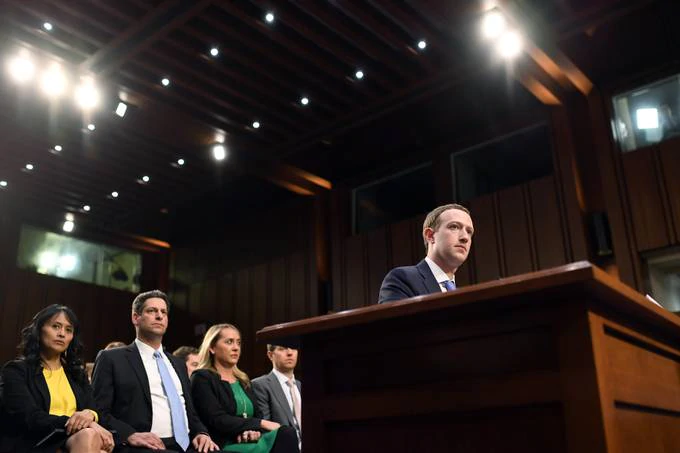
Facebook CEO, Mark Zuckerberg appears for a hearing at the Hart Senate Office Building (Photo by Matt McClain/The Washington Post)
American Edge, the new organization, intends to convince lawmakers and regulators that the tech industry is essential to the U.S. economy and the future of free speech through an ad campaign and other political spending, my colleague Tony Romm writes. The new group marks an escalation in the industry’s efforts in Washington as policymakers question whether Facebook and other Silicon Valley giants need to be broken up.
Facebook is using a tactic that other politically powerful players – such as the National Rifle Association – have deployed.
“The setup essentially allows it to navigate a thicket of tax laws in such a way that it can raise money, and blitz the airwaves with ads, without the obligation of disclosing all of its donors,” Tony writes.
Facebook is a primary driver in launching American Edge, but some people cautioned Tony that it is not the only one. A former Republican governor, federal regulator and Democratic congressman are on the group’s board. It has both Republican and Democratic advisers.
Twitter will start labeling misleading or disputed coronavirus tweets – even from President Trump.

The Twitter app icon on a mobile phone in Philadelphia. (Matt Rourke/AP)
The new labels will apply in situations where the risk of harm is not severe enough to remove the tweet, but it still could confuse people, the company said in a blog post. It’s the latest effort from tech companies to expand their arsenal of tools to fight an influx of misinformation about the coronavirus.
The labels will alert people the information in the tweet conflicts with public health experts’ guidance before they view it. They’ll link to a Twitter-curated page with more information or another trusted external source with details on the claims within the tweet.
Twitter says it will label tweets from world leaders, following weeks of criticism that tech companies have not been proactive enough in stopping Trump’s false or misleading claims about the virus from circulating. The policy will apply retroactively to tweets sent before it created the label, Twitter says.
The new approach to misinformation could eventually extend to other topics. Twitter already uses a similar label to alert people to manipulated media, such as deceptively edited videos.
The co-founder of Quibi says the coronavirus is to blame for the video-streaming service’s rocky start.
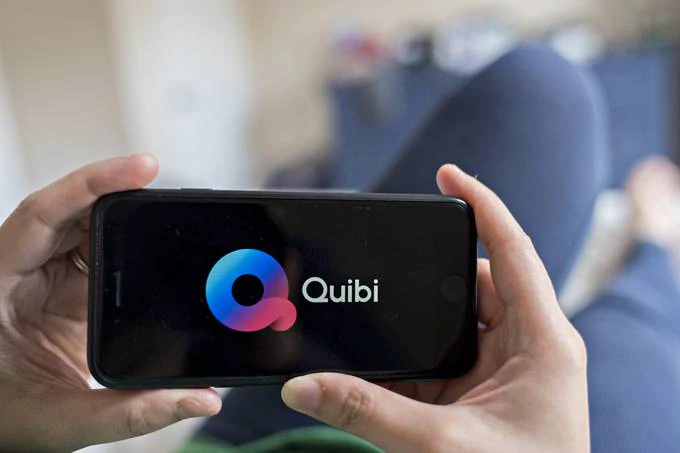
Signage for the Quibi short-form mobile video service Photographer: Andrew Harrer/Bloomberg
Jeffrey Katzenberg, the veteran film industry executive, and Meg Whitman, the former chief executive of Hewlett Packard Enterprise, raised $1.8 billion for the short-form video app and attracted a swath of Hollywood’s top stars for launch content. But downloads have been paltry, Nicole Sperling reports in the New York Times.
“I attribute everything that has gone wrong to coronavirus,” Katzenberg said in a video interview with the Times. “Everything. But we own it.”
The five- to 10-minute videos were designed to be consumed on the move while waiting for public transportation or in line at a coffee shop. But the app debuted after widespread stay-at-home orders took effect.
Quibi is ranked No. 125 among the most downloaded free iPhone apps in the United States, behind the game app Knock’em All and the language-learning app Duolingo, according to the analytics firm Sensor Tower. Quibi is even offering a free 90-day trial at a time where broad economic turmoil is forcing many Americans to tighten spending.
The app has been installed by only 2.9 million customers, according to Sensor Tower. Quibi tells the Times the figure is more like 3.5 million. Of those who have installed the app, the company says 1.3 million are active users.
Meanwhile, TikTok has continued to rise in popularity. Katzenberg seemed “steamed” when asked about the user-generated video service’s success, according to the Times.
“That’s like comparing apples to submarines,” he said. “I don’t know what people are expecting from us. What did Netflix look like 30 days after it launched? To tell me about a company that has a billion users and is doing great in the past six weeks, I’m happy for them, but what the hell does it have to do with me?”
The digital race to 2020
Inside the industry
Coronavirus fallout
Bookmark this
Before you log off
Dave Jorgenson takes on the high-stakes world of Wikipedia on TikTok:
Today’s first @washingtonpost quarantine TikTok features high stakes drama https://t.co/w9aHrERoqn pic.twitter.com/1wjKQV6emY
— Dave Jorgenson (@davejorgenson) May 11, 2020



